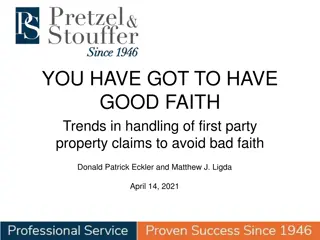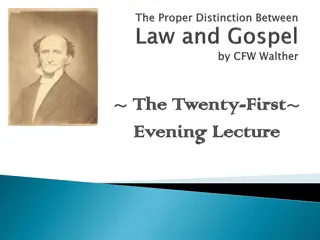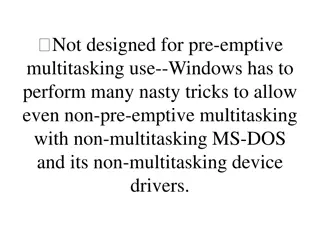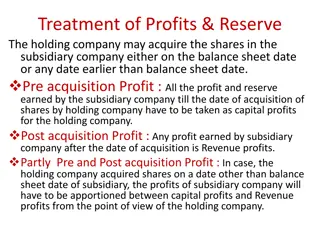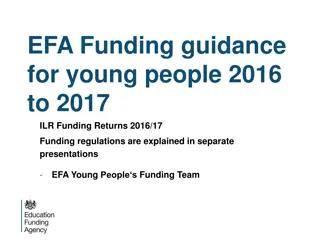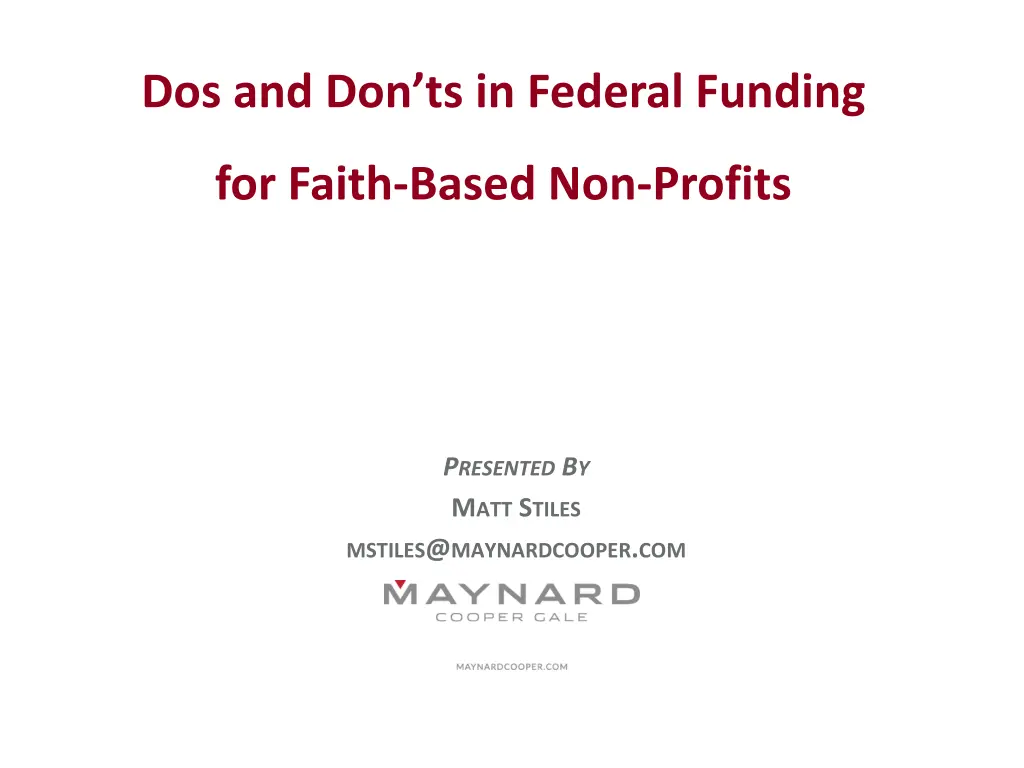
Federal Funding Dos and Don'ts for Faith-Based Non-Profits
Learn about the essential considerations in federal funding for faith-based non-profits, including third-party compliance sources, grants, insurance and referral contracts, and government contracts. Understand the protections, obligations, and legal exceptions relevant to such organizations when seeking and utilizing federal funding.
Download Presentation

Please find below an Image/Link to download the presentation.
The content on the website is provided AS IS for your information and personal use only. It may not be sold, licensed, or shared on other websites without obtaining consent from the author. If you encounter any issues during the download, it is possible that the publisher has removed the file from their server.
You are allowed to download the files provided on this website for personal or commercial use, subject to the condition that they are used lawfully. All files are the property of their respective owners.
The content on the website is provided AS IS for your information and personal use only. It may not be sold, licensed, or shared on other websites without obtaining consent from the author.
E N D
Presentation Transcript
Dos and Donts in Federal Funding for Faith-Based Non-Profits PRESENTED BY MATT STILES MSTILES@MAYNARDCOOPER.COM
Third Party Sources of Compliance Trouble for Faith Based Orgs Grants ARE ALL RACES PROTECTED? Insurance contracts Referral contracts Federal, state and local contracts
Grants Public or private Grants are intended to fulfill the agenda of the donor Rules placed on fund recipients use the funds as a carrot ARE ALL RACES PROTECTED? Understand the agenda of the funding source before applying for the funds Constitutional and other legal exceptions for faith-based orgs prevent governments from abridging the rights of faith based orgs, but do not affect the terms of a private grant, which are treated like contracts Although grants are like contracts, grants from a government usually do not constitute government contracts
Insurance and Referral Contracts Some faith-based non-profits provide counseling and psychological services that may be compensable by private insurance ARE ALL RACES PROTECTED? The Affordable Care Act imposes Title VII-like non- discrimination requirements on insurers and large health care providers The insurers and providers pass along those obligations to recipients of insurance dollars, subcontractors, and referral partners Constitutional and other legal exceptions for faith-based orgs prevent governments from abridging the rights of faith based orgs, but do not affect private insurance or referral contracts
Federal, State, and Local Govt Contracts Government contracts will routinely incorporate non- discrimination provisions Read them carefully and seek legal advice before signing ARE ALL RACES PROTECTED? Courts give governments the right to use the power of the purse to encourage certain behaviors as a condition of contracting with private entities Constitutional and other religion-based exceptions may be inapplicable, because no one has a constitutional right to contract with the government Do not assume that the law protects you from a contractual obligation! Department of Education has special protections for faith-based organizations receiving federal education dollars See 2 C.F.R. 3474.15
Contract Clauses, Generally One government contract provides: In consideration of the promises made by the State of Connecticut in this Agreement, Service Provider agrees that in the performance of services hereunder it shall not discriminate on the basis of race, color, religion, sex, national origin, pregnancy, age, disability, citizenship, military service, marital ARE ALL RACES PROTECTED? status, genetic information, sexual orientation, or gender identity. This language does not invoke any specific law Discriminate is not defined and these terms are not linked to the provisions of Title VII Agreeing to the contract does not negate the availability of religious exceptions to the law, but does not authorize those exceptions to compliance with the agreement Service Provider would be expected to comply with these obligations or risk whatever penalties may exist for breach of contract
Contract Clauses, Generally Consider the same language with redlines: In consideration of the promises made by the State of Connecticut in this Agreement, Service Provider agrees that in the performance of services hereunder it shall not unlawfully discriminate on the basis of race, color, ARE ALL RACES PROTECTED? religion, sex, national origin, pregnancy, age, disability, citizenship, military service, marital status, genetic information, sexual orientation, or gender identity. What is the effect of the addition of unlawfully to the contract clause?
Contract Clauses, Generally Look for clauses that seem to require a change in your practices ARE ALL RACES PROTECTED? Know that you may agree to a non-discrimination clause, even one that includes suspect protected classes, provided that the interpretation of what constitutes discrimination under such contract clause is the law, itself Your reliance on a religious exception constitutes compliance!
Affirmative Action Some federal, state, and local government contracts may subject a service provider to an affirmative action obligation ARE ALL RACES PROTECTED? Under federal law, the dollar threshold is just $10,000 to be subject to affirmative action requirements Affirmative Action usually means: Taking affirmative steps to recruit qualified minorities, females, disabled, and veteran applicants; Annually reviewing the effectiveness of your efforts; Maintaining data that tracks your applicant decisions; and Subjecting your organization to compliance audits
Other Pitfalls of Government Contracting Courts have found that receiving direct federal dollars constitutes engaging in interstate commerce, which (if gross receipts are $500,000 or more annually) subjects the ARE ALL RACES PROTECTED? organization to enterprise coverage under the Fair Labor Standards Act Generally, funds received from a state contract will not constitute interstate commerce where the funds are received from your home state, even if some or all of the dollars from the state were received by the state from the federal government
Other Pitfalls of Government Funds U.S. Supreme Court has said that faith-based organizations may not use direct government support for inherently religious activities Cannot use any part of a direct federal grant to fund religious worship, instruction, or proselytization ARE ALL RACES PROTECTED? services provided May use government money only to support the non-religious social Faith-based organizations that receive direct governmental funds should take steps to separate, in time or location, their inherently religious activities from the government-funded services that they offer Carefully account for the use of government dollars, maintain separate accounts, if necessary Consider setting up a separate 501(c)(3) to keep programs that receive government money separate from those that engage in inherently religious activities Rules do not apply to indirect aid
Other Pitfalls of Government Funds Government contracts tend to be high profile Media outlets regularly cover government contract awards ARE ALL RACES PROTECTED? Competitors for government dollars have the ability to protest contract award decisions The result is that participation in government contracting often results in unwanted attention that can trigger undesired scrutiny from the media, the community, competitors, lawmakers, and persons hostile to religion
PRESENTED BY MATT STILES MSTILES@MAYNARDCOOPER.COM




